Frank Gossner – Brooklyn, NY
have the great pleasure to feature Frank Gossner, who some of you might also known from his amazing African Funk parties in Brooklyn. yes, I’m talking about Voodoo Funk!
Our first stop was at the German House in the United Nations Plaza. The packages were waiting for him there to be picked up. A very quick loading to the car, and we are already heading back to Park Slope in Brooklyn to open those fresh boxes. I could feel Frank’s excitement just as a little kid before opening his birthday presents.
Q: What was your first album? How did you get it? What age? Can you describe that feeling? Do you still have it?
A: My first record was a Beach Boys “best off” album I got from my father for a good grade in my German class when I was around 7 years old. I don’t have it anymore. It wasn’t a particularly great record so I don’t really miss it.
Q: what was your Initial interest in music? Did you have any influence from your family? Perhaps your best friend?
A: My father was listening to a lot of Rock, mostly what you would call classic Rock, Jimi Hendrix, Janis Joplin, Led Zeppelin, The Who, stuff like that. I think Woodstock and Easy Rider were the first two movies I ever saw in a theater when I was about 5 or 6 years old. When I was around 15, I started going to punk shows and wear my hair in multicolored spikes, I hooked up with some older friends who had cars and really cool taste in music. This was an incredible time… I lived in the Black Forest and it would have been a boring life if it wouldn’t have been for Thomas, Martin and Wolfgang who would take me to places like Frankfurt, Munich or Zurich to see incredible bands like the Gun Club (Miami period), X, Suicide, the Cramps and pretty much everything that was hot in the early 80s.
Q: Why vinyl?
A: What else? Vinyl is the most civilized way to listen to recorded music.
A: Amen to that!
Q: Rare records from West Africa dominate your collection. What made you start looking for African music? Could you describe the circumstances that led you into this music?
A: Music is a journey. You start at some point and you shouldn’t be afraid to end up somewhere entirely different and unexpected. I was into punk as a teenager and up until my early twenties I would spend a large part of my disposable income at the record store. Sometime in the early 90s I got bored with contemporary music and at the same time the stores stopped selling records and instead attempted to force-sell me CDs. I was like “fuck this shit” and instead turned to buying all sorts of weird or interesting looking records on flea markets. I also was heavy into exploitation movies in those days. I would go on digging trips where I would look through every single video store, city after city to try and find obscure movies, especially horror and sexploitaion. A lot of the more interesting stuff was banned in Germany and some of the original rental tapes were highly collectible. I sold spares at movie fares and made quite some dough with these sick little flicks.
I really got into the Hammond heavy funk tunes they sometimes would use for these movies, especially when there were strip club scenes. I got obsessed with trying to recreate the vibe of 1970s crime movie strip bars and began DJing my own parties. I hired dancers and projected movie scenes, lobby cards and movies posters onto the walls. I even went as far as to buy a custom made chrome plated go go cage. Hahaha… those were the days. People thought I was crazy but everybody had to come and check out those parties. There was this illegal warehouse club in Berlin called The Hohe Tatra which gave me a residency. Those nights were off the hook. I couldn’t believe the fun I was having and goddamn, I got paid money on top of it!
A friend of mine had a record label called Crippled Dick Hot Wax and in 1995, I helped him re-release the soundtrack to Jess Franco’s movie Vampyros Lesbos. I saw this record in another post on your blog not too long ago. It’s really strange when a record that you helped put out becomes a “digging object”. Well, it’s over 15 years old so I guess that makes it an old record. This record was a huge success and so were the parties I threw under the same name. I toured all over Germany with a van full of dancers, the gogo cage and two crates full of records. In 1996 I moved to NYC. My friend’s label had sub-licensed the Vampyros Lesbos record to a record to a US label called Motel. They were a bunch of psycho crooks and I think my friend lost quite some money with that shady outfit but the record still sold like hotcakes and my parties were going strong. I had a great run for 4 straight years. This was a weekly night and it was always packed. It was a wild scene back then, I could tell you stories… but afterwards I’d have to kill you.
By the late 90s I started really getting into funk 45s and also began throwing funk parties. Nobody in NYC was interested in funk back in those days but at the same time I was getting tired of playing sleazy Euro grooves and French 60s pop. Another problem was that Giuliani’s nightlife Gestapo was getting more and more out of control. Our club got raided repeatedly for “illegal dancing” because they didn’t own the proper cabaret license to legally have a dance floor. In the summer of 2000 I packed up and moved back to Berlin where I started a new funk party called the Soul Explosion.
On one of my funk 45 digging trips to the US I found a stack of Nigerian records at the legendary store Smith’s Records. Amongst others I got the Pax Nicholas LP there which I later re-issued on Daptone Records. I was blown away by this music and began buying whatever was out there at the time in terms of re-issues and compilations. I got married sometime along the way and my wife got into a career as a diplomat. She was about to be sent on a long term assignment to a foreign country and we decided West Africa might be a rewarding destination, at least I’d have something to do down there and go hunt for records. There was a position opening up for her in Guinea and that was it. This was in 2005 and we stayed for 3 years. It was crazy. I felt like having my mind blown to bits every single day. A life altering experience.
Before I moved to Africa, I put all my American funk records into storage and when I moved from Africa to NYC in 2008, I started selling all of this stuff. A lot of my old DJ friends and funk collectors found this to be weird but to me it felt only natural. I spent an even longer time playing these records as was the time frame they were created in. Typical, rough deep funk 45s all were recorded from 1968 to 1972 or ’73. That’s about 4-5 years. I played these records out for 6-7 years and while I have great respect for people who dedicate a long period of their lives to exploring this sound, I felt the urge to move on. The great thing about recorded music is that you can move freely within time and space and somehow it just felt right to move from US funk on to its African pendant.
West African Funk and Afrobeat with all the hybrid styles of more traditional but still funky and club friendly tunes is a huge field. I get to discover new records every month. Stuff that nobody outside of Africa has ever heard and this is what really excites me. With US funk 45s it’s a rarity to come across something new and even much rarer to discover something that’s not only new but also really good. I think African music could keep me busy for many years to come.
I already have plans for this winter to go on several long digging trips through various West African countries. How one of my favorite singers puts it: “People often talk about being scared of change. But for me I’m more afraid of things staying the same. Cause the game is never won by standing in one place for too long.”
Q: Ohh yeah!??! Will you take me with you?
A: I can’t take you with me to everywhere I go but maybe we can meet up somewhere for a few days…
This one contains the African Brother’s incredible Funk joint “self reliance”.
Q: That sounds like a dream of a life. I bet you had such an inspiring journey. Having all the time in your life, minimum obligations, keeping a low profile. Sounds like an incredible journey.
A: Yeah, it was fun. Being able to move at a very slow pace enables you to take it all in very consciously. If you’re in a hurry you might miss some things and not get the fullest possible experience. The West African infrastructure in general is extremely time consuming and having a tight schedule would invite stress and frustration.
The patch on his back reads “save power – eat raw meat!”
Q: After a while you started to employ several “Vinyl agents” who would search for records and send them to you. How did you manage to describe your exact taste and sound that you are looking for? How good does it work for you?
A: I owe a lot of my records to my agents Damian and Kenneth in Nigeria, Landry in Benin and Ken in Ghana. These guys have been doing amazing work and are still tirelessly traveling their countries in the search of vinyl. It’s important for many reasons to have someone trustworthy on the ground to help locate collections and also to provide company and local experience on my own travels. I provided all my agents with portable record players and some developed a strong personal interest in this music. Ken for example began buying some records just to keep them for himself. He developed a strong sense of pride for his country’s cultural heritage. We’ve had amazing times traveling together and became really close friends.
All my agents send me large packages with records while I’m gone and they make a really good living with their work. I buy a few of these records that I want to keep for myself at a fair price and then I forward the bulk of records to a friend’s record store here in NYC (www.goodrecordsnyc.com) and to another friend in Paris who runs a very reputable mail-order business and also has an incredible record store (superflyrecords.com). I don’t make any money from these transaction for myself and 50% of the final sales price gets sent to the agents. If records end up on eBay, I even send my agents the links to these auctions so they see their finds generate money for them. To me personally, this isn’t a business but a hobby. I don’t need to generate money for myself with these records. All I want is more records. I have a few high profile collector friends with whom I trade records. If I ever sell some records like at last weeks WFMU record fair, this money always goes towards the next plane ticket to West Africa.
There are some killer funk 45s on the Essiebons label…
Q: While looking for records, you must have come across different stuff other than records. Photos, personal belongings, lost articles and such. Any interesting stories around it?
A: These are photographs by Albarika Store label owner Seidou Adisa which show him with various of his artists in this picture it is Nahounou Singer.
A: On one side, I keep what I think has club appeal but I also keep records which I just generally like. I’m a big fan of what they labeled as “native blues” back when these records were pressed and I also really love some of the deeper, heavier Highlife stuff from Ghana and the local style from Benin City in Nigeria (no relations to Benin the country). I also enjoy a lot of the more traditional music from Senegal, Mali, Guinea, and Benin.
Q: You were once accused by people who read your blog, of exploiting Africa’s intellectual properties, by taking those records away from the mother land and selling them in Europe and America. How do you handle these accusations?
A: I laugh about those fools real loud and hard. None of them even know what they’re talking about so even if I’d want to try and take them serious, I just couldn’t do it. One of the most important lessons I have learned a long time ago is that it never pays trying to explain yourself to the jealous or the ignorant. It’s much better to ridicule them and maybe provoke them a bit for personal entertainment. The real problem isn’t too many westerners going to Africa to buy up old records. The problem is that most records got disposed off by their owners before anybody showed any interest in this stuff. I’m dead certain that a whole bunch of releases will be forever lost because nobody thought of conserving these things. The news that now there are a whole bunch of people flying to Africa to look for records spread fast and these days a lot more Africans are aware that these things have some serious monetary value. While trying to understand the foreigner’s fascination with these relics, they often also understand the cultural importance of this stuff and I can’t see how any of this could be a bad thing.
There is a lot of exploitation going on in Africa, often to staggering degrees and the continent’s vast riches always end up some other place on this globe. I’ve seen the most repulsive acts of corruption, both, corporate and private. Most African countries there are run by thugs. Criminals who hold their own people hostage. They let international corporations plunder their countries while privately making millions under the table, moving their families abroad and building mansions around the world. If they want to fight third world exploitation in Africa, I could tell those internet activists where to go and who to speak out against. But they won’t do go. They’re busy sitting in their cubicles, updating their status on Facebook.
“Dou Dagbe We” is one of the tougher to find Black Santiago 45s out there…
Q: What was the general condition of the records you found? Were they most often badly treated? Were did you find the cleanest most preserved records? And what about the most neglected mistreated bunch of records?
A: Sometimes I would find records that were completely hammered in the same stack with a few really nice copies. Most often everything was just so horribly scratched, I couldn’t do anything with them. Finding records is really hard in Africa. Finding clean records is much harder.
I probably found the cleanest records ever at the houses of several Ghanaian radio DJs.
The craziest thing I’ve ever seen was when I was supposed to meet with someone who said he had a lot of 45s. After waiting several hours, the young man finally arrived. He was a worker from an auto garage and wore nothing but a pair of raggedy pants which were saturated with black engine oil. His entire body looked like he had spent the day submerged in a barrel of well used motor oil. Around his shoulder he wore a thick rope which he had threaded through the center holes of several hundred 45s. The sight was just unbelievable and of course none of the records were usable. I paid him some money to get transportation back to his job and also to make up for lost wages. I still regret not having asked him to let me take his picture but I felt bad for not having bought any records and didn’t want to embarrass him.
The Wellis Band put out two killer 45s on the Sole label. One of them “Bindiga” was featured on the recent Ghana box set on Soundway records and this is an instrumental organ funk burner named “pick pop”.
Q: Tell me a wild digging story from your adventures. I’m sure there are too many, but one should be enough.
A: I’ve lived through my scariest moments when my friend Landry and I were driving from Parakou back to Cotonou and found us in a head-on collision course with a convoy of thousands of cars, including some of them wrecks that barely looked drivable, all operated by drugged up kamikaze car pilots. It’s impossible to get an accurate picture of the situation without actually having been there but I’ll be damned if I didn’t get dangerously close to shitting my pants out of sheer fear for my life.
read the whole story here:
Q: Nigeria is known to be a violent and corrupted country. Any insight on that? How did it affect your record digging? Where you ever in danger?
A: You know, when we complain about corruption in Africa, we shouldn’t forget that if you follow the line of corruption, you always find Western (or Eastern) multinational corporations. We want these countries to bee corrupt. Otherwise we couldn’t buy their resources for a fraction of their real value. And then look at our own governments. There are more than a few that are just as corrupt, only in a much more sophisticated way. I prefer open and outright African corruption any day to the cowardly ways of some of our faux democracies which in essence are nothing else but cleverly camouflaged friendly dictatorships. Violence is a part of human nature, in our “western” societies which some would say are more advanced, violence is channeled and for the most part kept out of human interactions. Safety is being provided by authorities. On the surface, this might make for a more secure life experience but this doesn’t make us better people. There are still dangers lurking everywhere. The bank that lured you into a loan, fully knowing that it’ll break your neck might come and take your house away. A cop might shoot you or shove a plunger or a baton up your ass just because he’s had a bad day and no witnesses are around. What about the Guinean immigrant who some years back had escaped his third world dictatorship to NYC just to get blasted with 41 bullets for standing in his own doorway and reaching for his wallet. I feel perfectly fine whenever I’m in West Africa, including Nigeria. It’s a great place to be. People are less paranoid and more relaxed.
But back to the topic: I’ve usually just touched down in Lagos, gone through a couple of collections to take off again after a day or two. I’ve only been on one lengthy visit to Nigeria and traveled around, including some of the no-go zones in the South East. It was pretty crazy. I took rides on small overland buses the size of a mini van. Larger air conditioned buses are much more comfortable but they also are prime targets for armed robbers and would-be kidnappers. What looks like a police road-block can just as well be a hold up and coaches are regularly pulled over, people with automatic weapons go on board and collect valuables. If you look like someone might be willing to pay money for you, you might be asked to get off the bus. I had heard a lot of crazy stories and that’s why I stuck to the smaller buses. For the first few miles still inside of Lagos we were joined by a priest who didn’t pay for a seat but stood in the side door, which remained open for ventilation purposes. He blessed us passengers and loudly prayed for us. In a high pitched voice and getting more and more excited with every sentence he went on: “The front tire, it will not bust! Dear lord thank you for promising us that the front tire it will not bust! And the back tire, dear lord, the back tire, it will refuse to bust! It will not bust and the driver, god in heaven, the driver he will not fall asleep and he will bring you to your destination so you will be re-united with your loved ones and the lord will protect us against the wickedness of armed robbers for that they will not stop us and we will all reach where we are going safely…” This went on for the better part of an hour and after everybody had given him some change, the priest left us and hopped onto another bus that needed blessing.
We passed through a town and there was a big commotion in front of a gas station and right when we were in the middle of the mob, the traffic stopped completely. There was a hearse parked at the side of the road, directly next to our bus that had been pulled over by a heavily armed army police patrol. There was a lot of yelling and several large women in festive robes were screaming at the armed men while getting more and more upset and aggravated. The whole situation threatened to completely get out of hand when one of the soldiers forced the back door open and began dragging out the coffin. It became apparent that they suspected something else to be in there but a corpse. Our fellow passengers started screaming at the driver to get the fuck out of there while the yelling outside intensified and the soldiers began to wildly point their AK 47s at the exceedingly agitated crowd all around them. Two uniforms pried the casket open, the screaming intensified even more and out of a sudden we were moving again. I didn’t want to look back.
Orlando Julius’ double sided killer 45 “james brown ride on”/”psychedelic afroshop”.
Q: Is there a specific musical instrument that attracts you when listening to music?
Tunji Oyelana & the Benders had one of the most unique sounds. Always very deep, very heavy and guaranteed to shake the dance floor.
There are like 4 killer tracks on this incredible record. My mind was already blown when I had finished reading through the 38 (!) Bands Jaga had previously played with that are all listed on the backside of the cover… The Bullets”, “The Black Spirits of Cameroun”, “The Afrodelic Trolls Of Kano”… what the fuck???
A: There is no unlikely place when it comes to finding records. I haven’t bought a record in a store for many years. real digging is all about finding records where others haven’t looked. I always think of records. Whoever I talk to in the course of the day, I steer the conversation so I can find out if he has any records or if he knows anybody who might have records. Sometimes I drive down a random street and catch myself trying to figure out behind which walls there could be records. I might stop random strangers and ask if they know about somebody in the area who might have some old records. Once I find some records, I focus on them and it doesn’t matter if I’m in an open air kitchen, in an old radio store, an insect infested warehouse, somebody’s basement, the flooded basement of the old, Guinean government palace that was abandoned after troups had shot a missile into its facade during some coup attempt some 25 years ago or if someone just brought a bag of records to me while I was sitting inside an air conditioned hotel bar.
You are highly unlikely to find rare records at the most likely places. There’s a reason these things are rare and they wouldn’t be rare if you could just walk into a record store and buy them.
One of the many Fela inspired artists who released heavy Afrobeat records on one of Nigeria’s uncountable private record labels.
no idea if I’m ever going to succeed in tracking down the movie to this killer soundtrack.
A: I sort out all the records that I don’t know and play them on a portable record player. I don’t want the dust and grime to get onto my MK2 so I use the portable for this. Needless to say, this is more exciting than being a kid and opening up Christmas presents. It almost drives me mad with anticipation and enjoyment.
A: My wife enjoys music as much as I do. I don’t think she would call me obsessed. We’ve been together for around 20 years and she hasn’t complained about anything so far…
A: I don’t have a single record that I would say has a bad album cover. Quite some show relatively crude artwork but in their boldness also lays beauty and unpretentious directness. Every time I hear some fool say “oh look at this cover, it’s so bad that it’s cool” I feel like punching them in the face. I don’t even feel like commenting on any of these covers. If you can’t see the beauty in them and feel the promise they hold (and rarely disappoint) I feel sorry for you. (I’m not talking to you directly here, this is purely rhetorical). These things come from another world and from another time, these are artifacts that demand respect. Admire them, yes. But analyze, rate or even judge -hell no!
A: When I visited Freetown in Sierra Leone for he first time, I took a taxi to the headquarters of SLBS (Sierra Leone Broadcasting Services) and I asked if they would have any records. I was lead to an overgrown foundation and I was told that this once was the location of West Africa’s largest record library featuring complete discographies of all English speaking West African countries. Until the so called “rebels” from the RUF burned down the entire building when they overran the city in January of 1999 during operation “no living thing”. Of course the human loss and suffering they inflicted makes a burned house full of records seem like not worth mentioning but it was just crazy looking at those ruins.
It is generally sad having to realize that what I do is merely scratching the bottom of the barrel. It would be more of a guess than an estimate but I would say that probably at least a third of the African pop music of the 1970s that ever got recorded will most likely never be found again. Earlier this year in Lagos, I found an album by Orlando Julius, one of Nigeria’s best known musicians. This record was released in 1973 on Philips and for some reason, nobody I spoke to, -and I asked pretty much all the big collectors of African records I know of, -had ever seen or heard of it. One day I went through a collection of Ghana 45s one day that was just enormous. I would say this must have been most Ghanaian 45s that ever were pressed all in one place. After a few hours I pulled out a white label test pressing that had “Marijata -make it funky” written on it. While every other record in this collection was in EX condition, this one record had a large piece missing, it was completely unplayable and I was just devastated. In light of all the other great finds that day I had still made the most incredible single haul of my entire digging career but to find a completely unknown test pressing 45 by one of your most favorite bands and having to realize that it was unplayable was a real stab to the heart. When asking their drummer, he said they never recorded a song under this title. The handwriting on this 45 however also mentioned the name of their label. Who knows what this was… after discovering this record, I put it on a window sill on the terrace outside the house, apart from the other stacks of records and when I went back to get it after I had dug through the entire collection, it was gone. I searched the entire compound like a madman but couldn’t find it. I even returned to this house the next two days to go through all the remaining records again and again but it was just like this record had evaporated or never been there in the first place. Sure, it was unplayable but maybe I could have just dropped the needle on it outside the missing area to get a rough idea of what the song would have sounded like and to have proof that this track really existed. Maybe it was all in my mind…
A: This almost happened to me only once with an incredibly rare Stan Tohon LP which I didn’t pick up because the owner was being a dick. I went back a few months later after first making sure he’s not there and bought the record from his wife who was a total sweetheart.
Let’s seal this interview with a few words from you to fellow diggers, young collectors who just started to collect or to the veterans, who forgot about vinyl.
The most rewarding moments are always when you get to meet some of these old musicians. It was such a pleasure to work with Malek Crayem and Ricky Telfer on the re-issue of thePsychedelic Aliens catalog. Getting to meet Pax Nicholas and putting out his record that never has been distribution, not even back in Nigeria after he had recorded back in the 70s. Last month I had Albert Jones, the band leader of the Freedom Family over at my place here in Brooklyn for a week. We went to one of my dj gigs together and he was just blown away that people would still dance to his music 35 years after it had been recorded. He hadn’t even kept his record and didn’t have any recordings of it so it also had been decades that he had last heard these tunes. A few days ago, I finished working with Orlando Julius on re-issuing a completely forgotten LP by him that was recorded at Ginger Baker’s studio in Lagos back in 1973. This one will blow some minds when it gets out early next year, I can promise you that. Just last night I had dinner together with Kofi Elektrik, the drummer of Marijata. Kofi brought over some absolutely incredible old photographs and also had some amazing stories to tell. We were even talking about possibly getting his band back together for some recordings and perhaps even a tour… we will see what happens.
That’s it folks!
hope you enjoyed this post, reading, listening or just watching the photos.
If you did enjoy, please help spread the word and pass it to a friend.

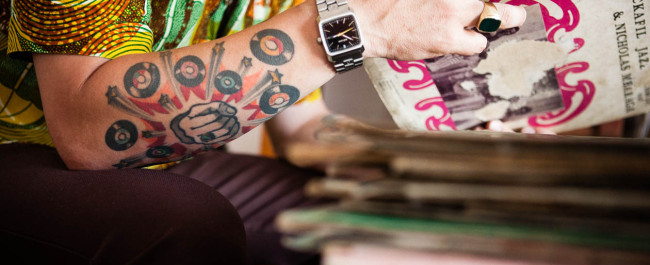
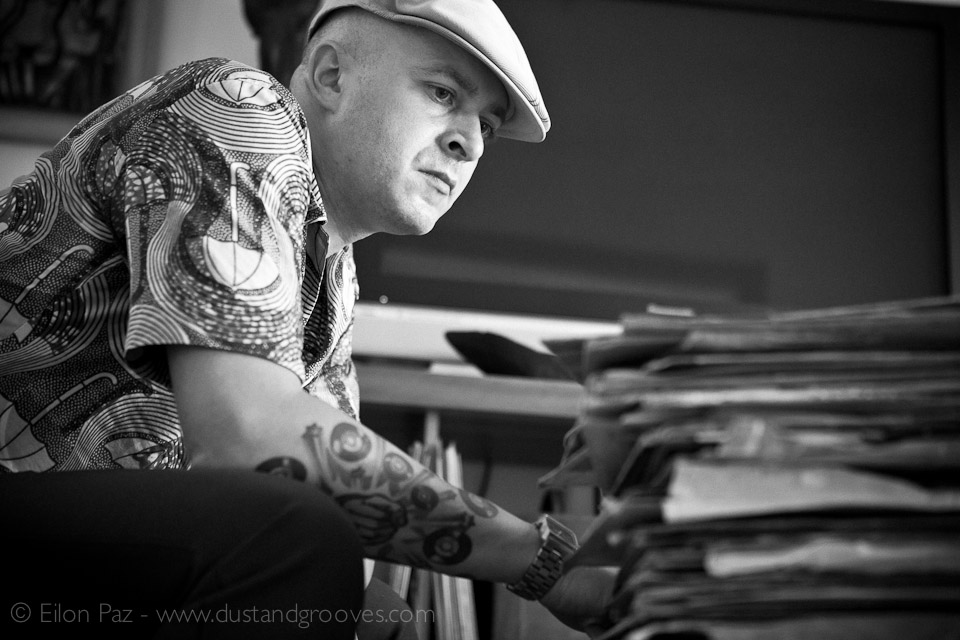

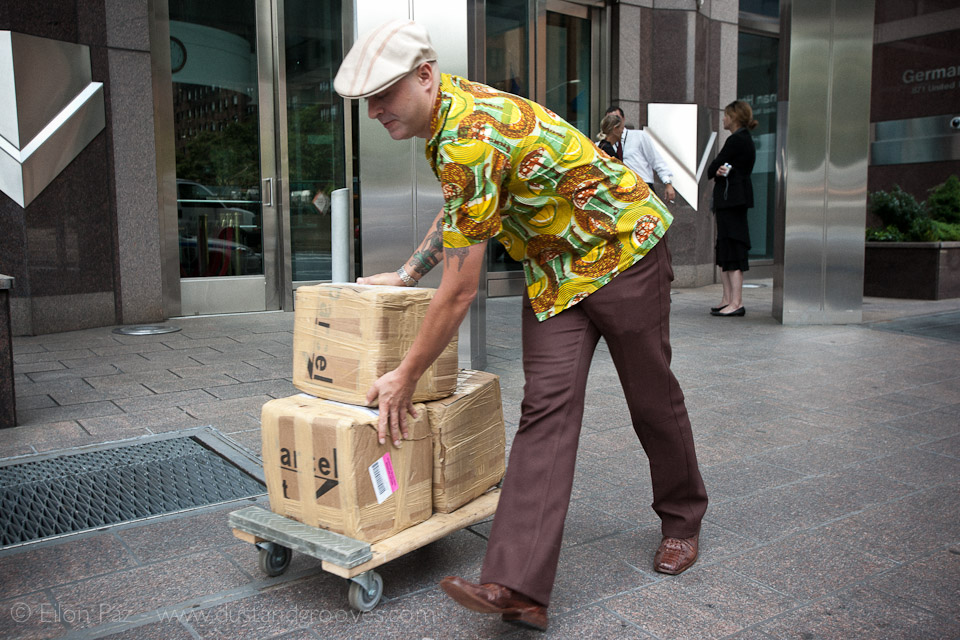
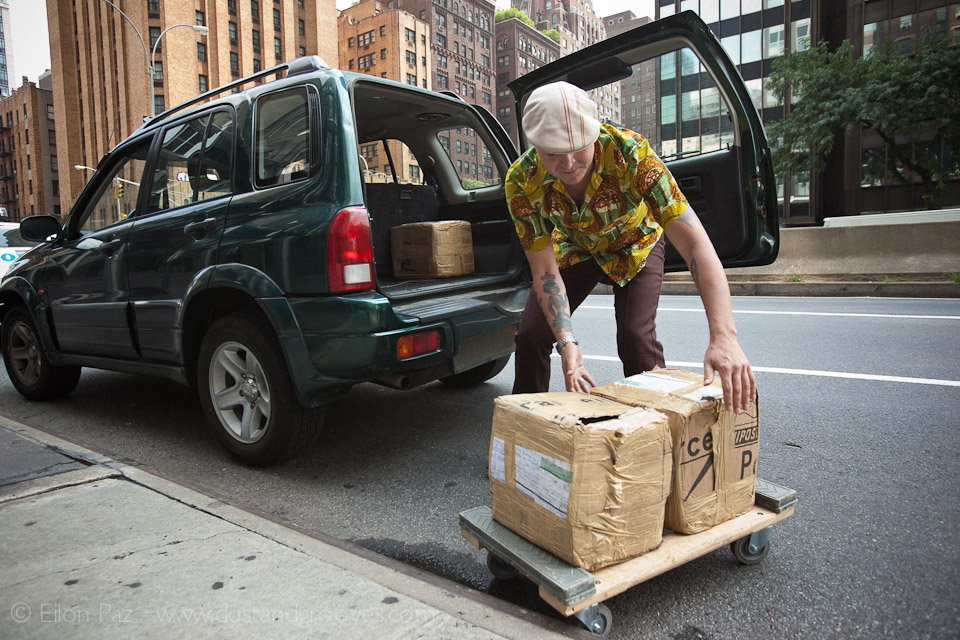

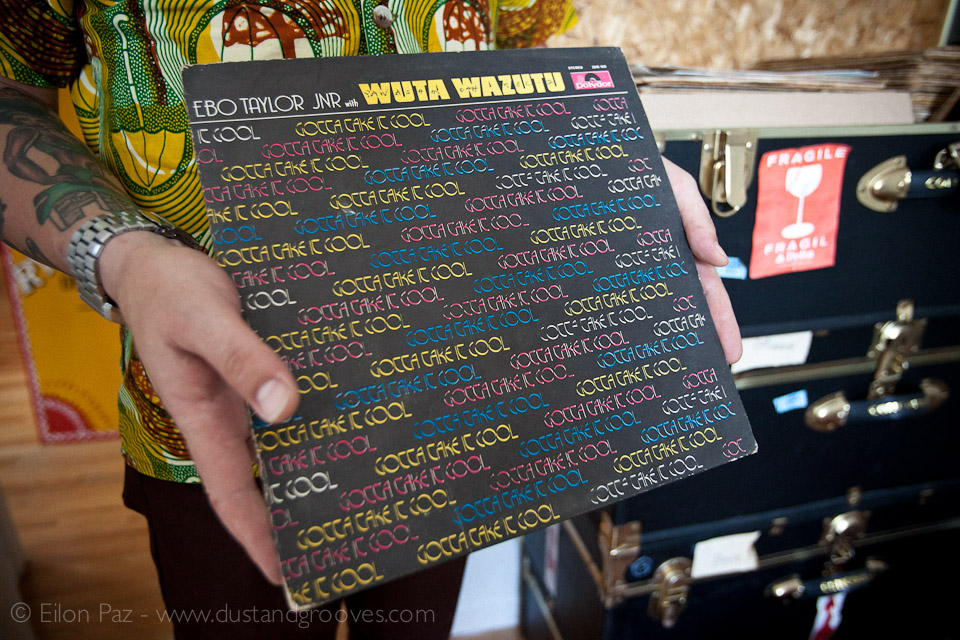
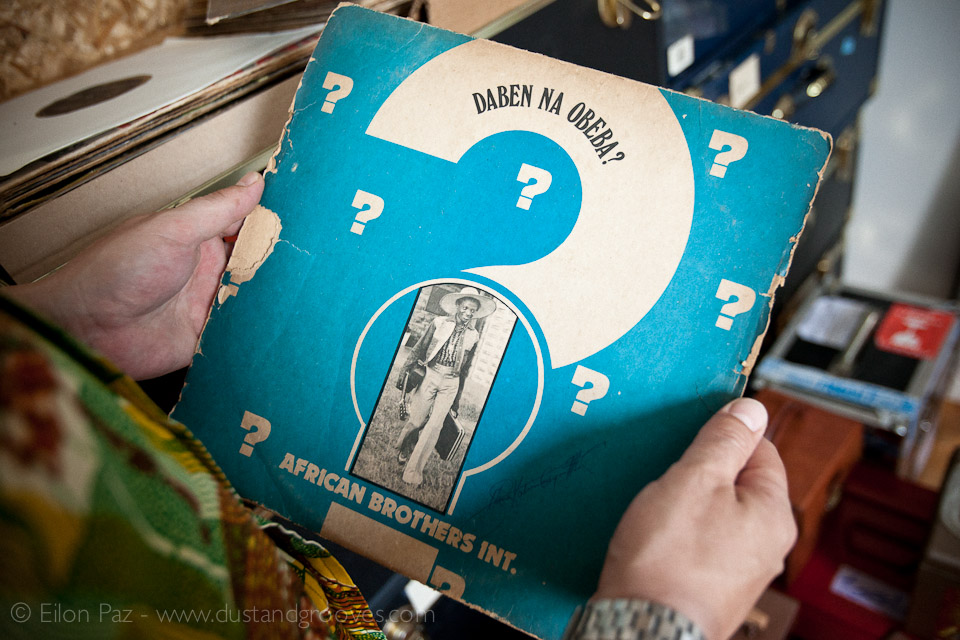
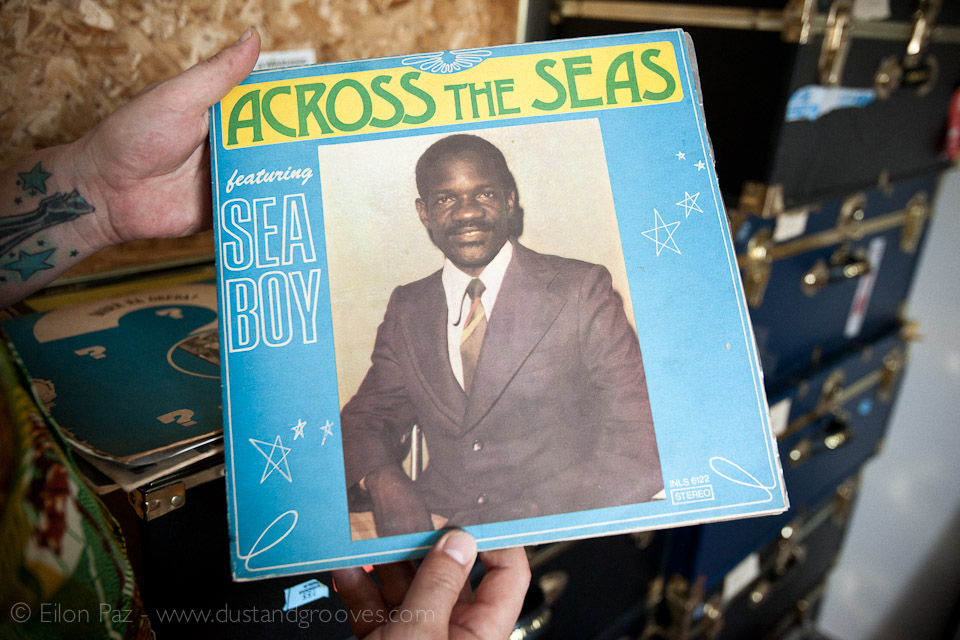
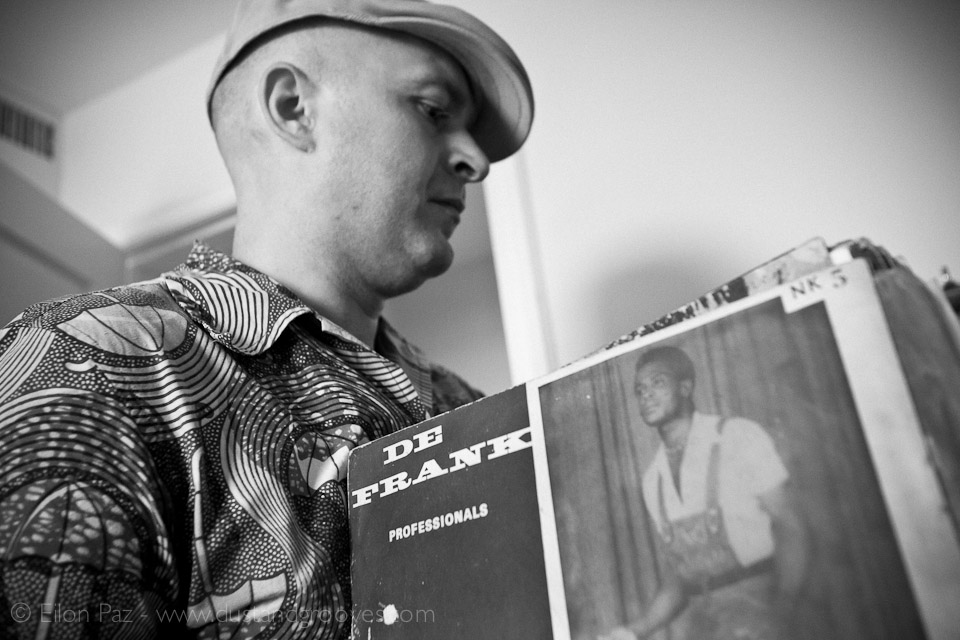
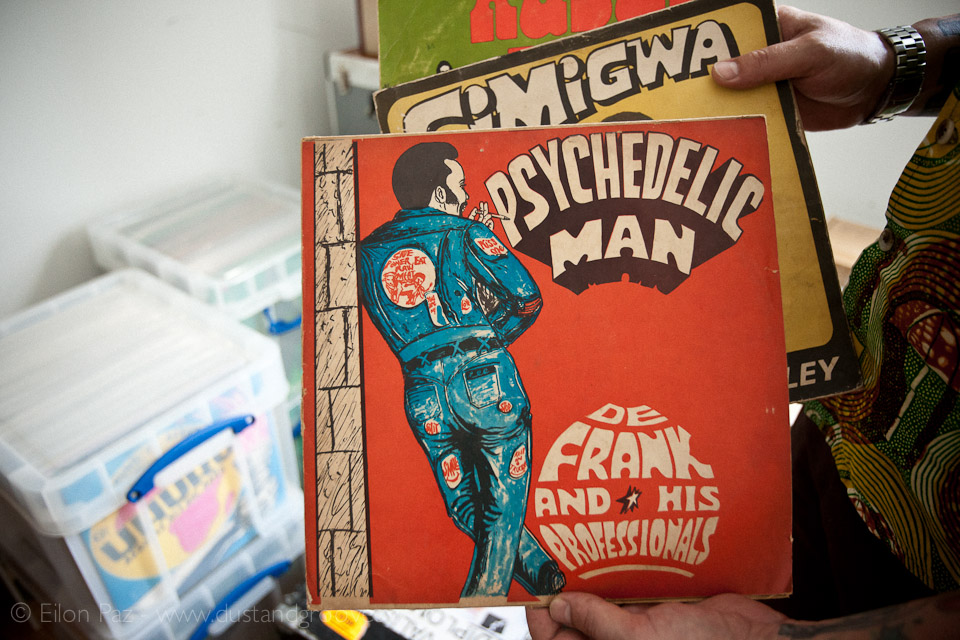


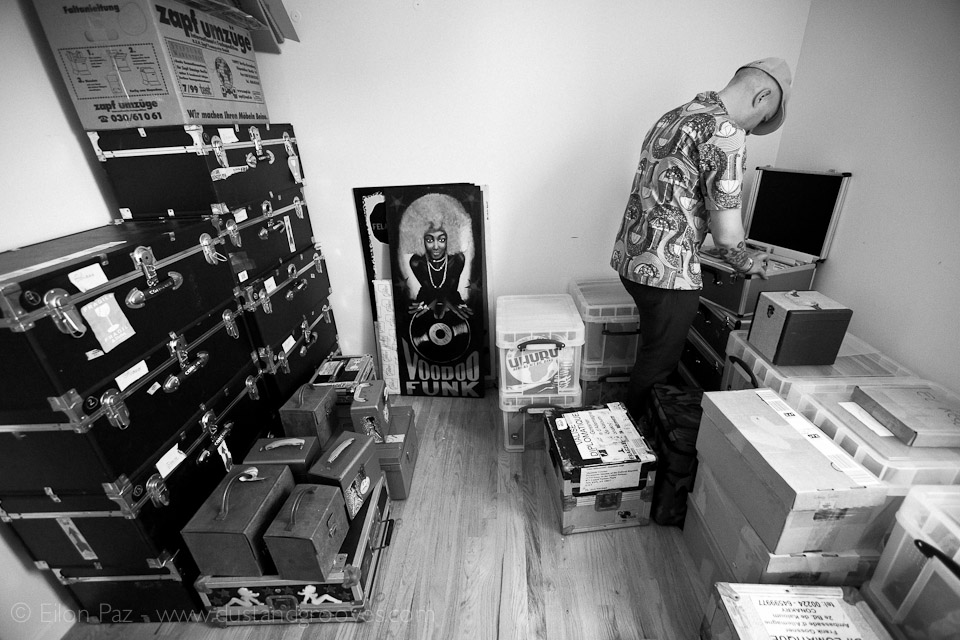
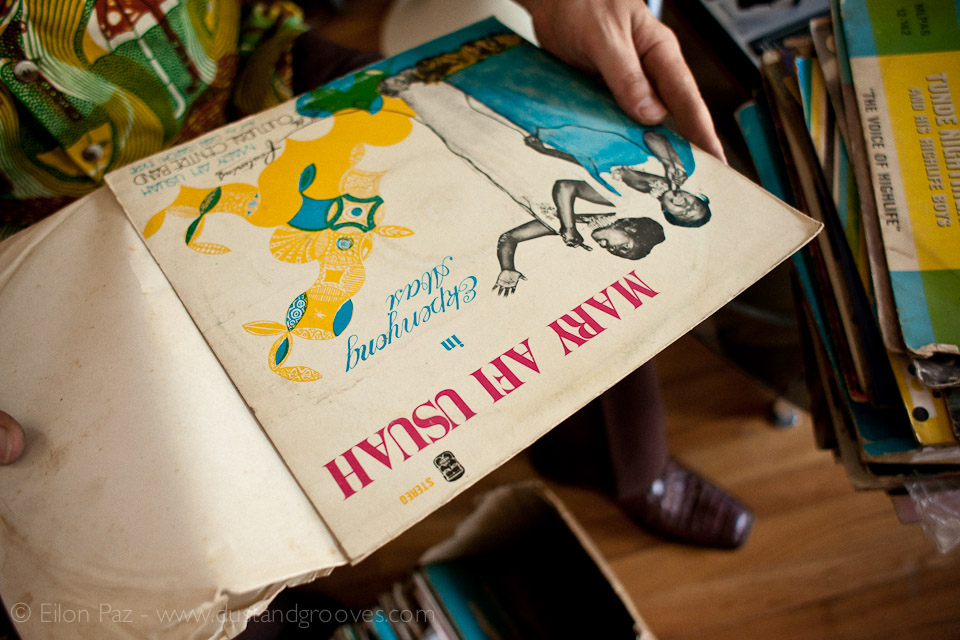

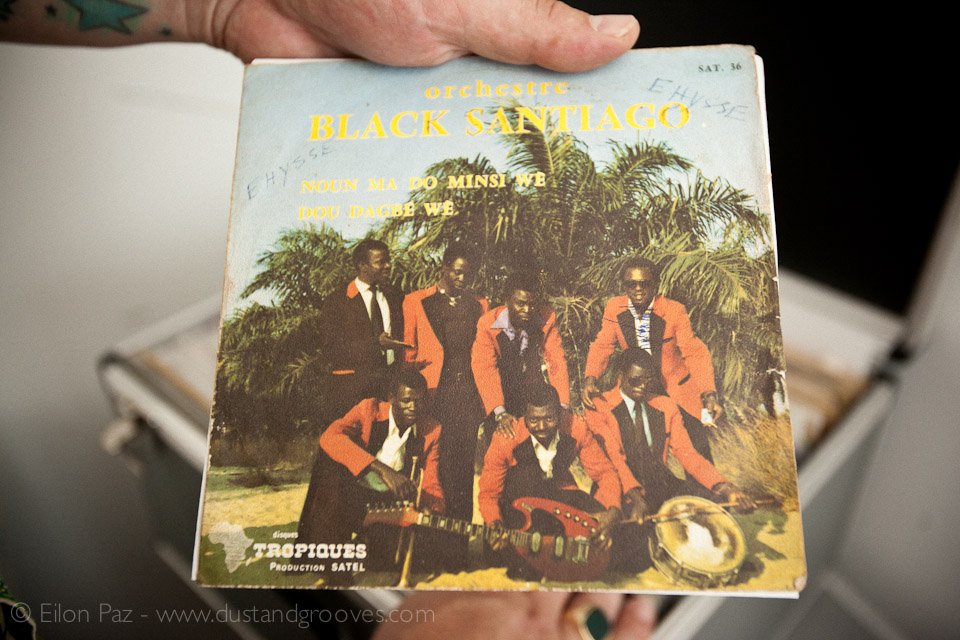
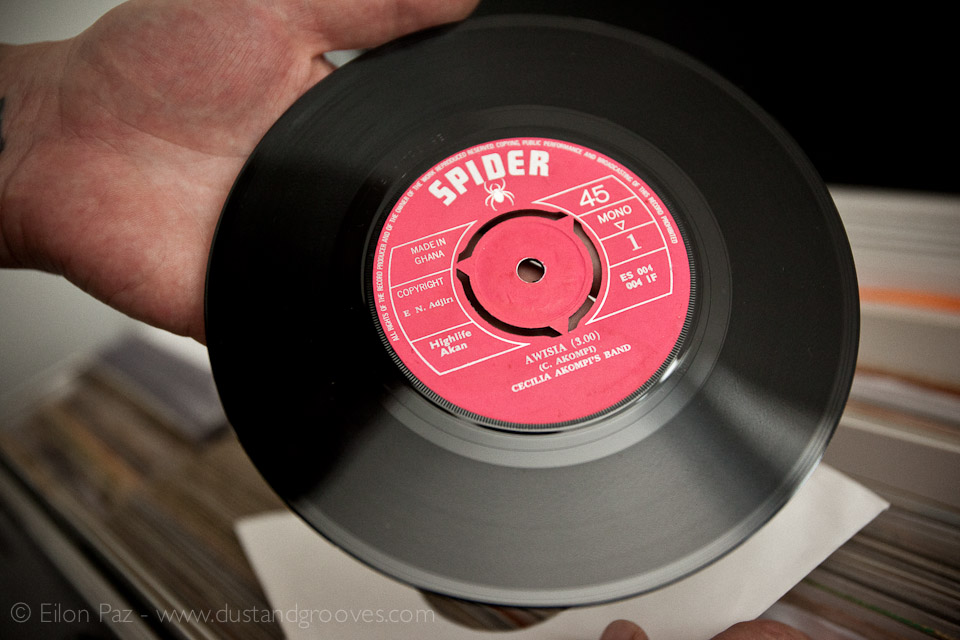
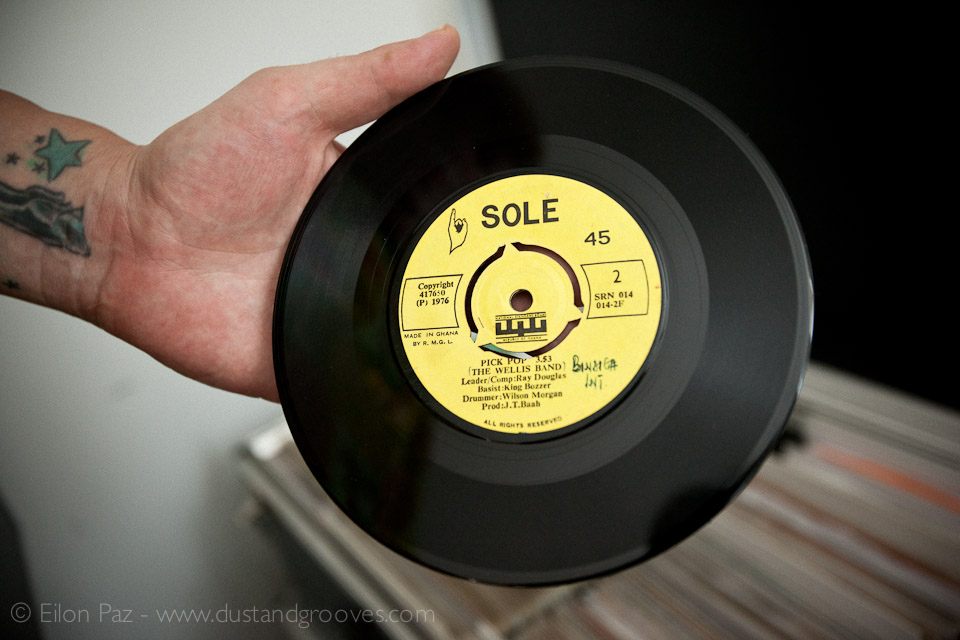
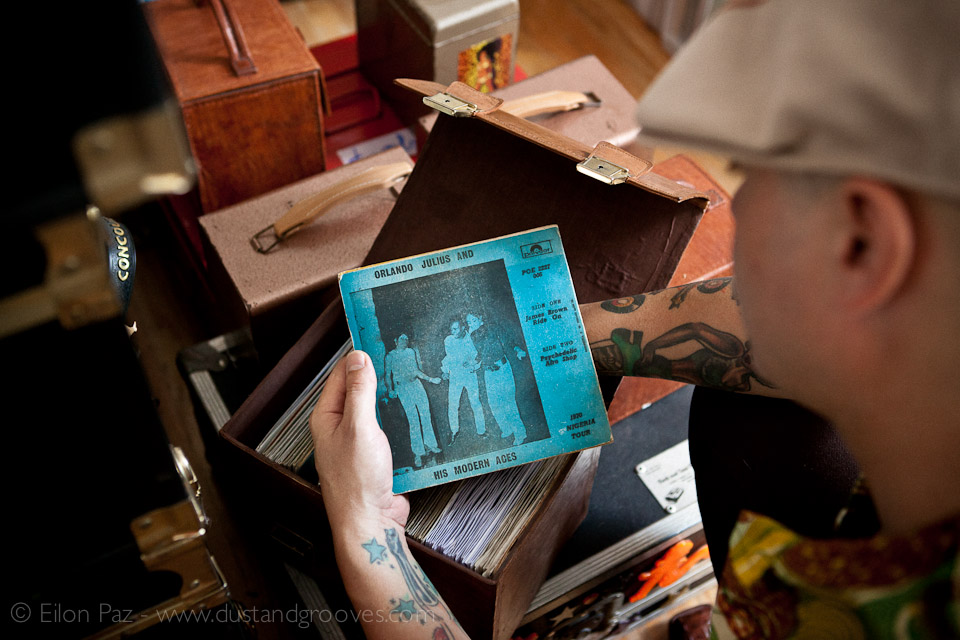
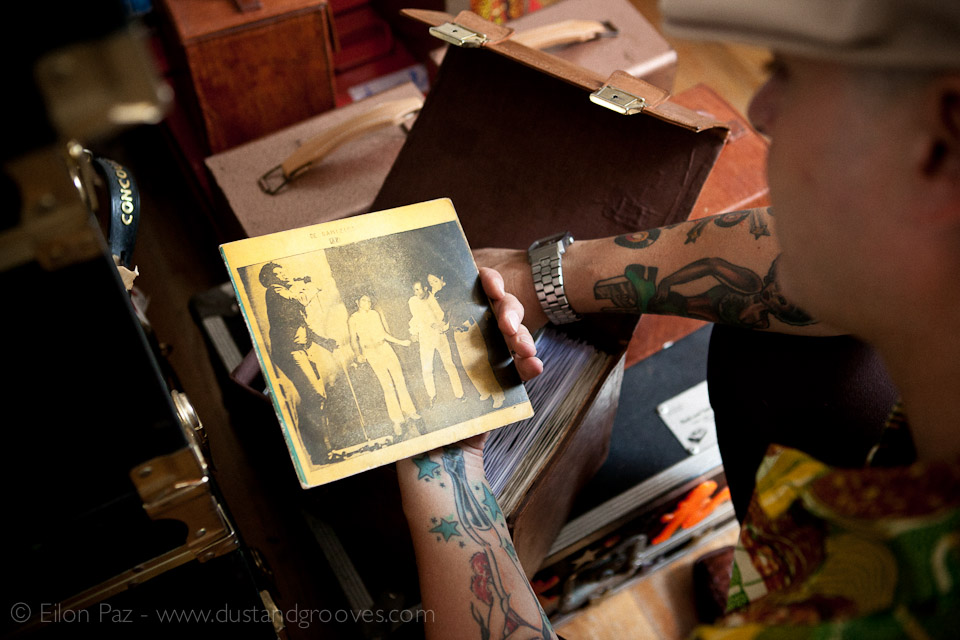
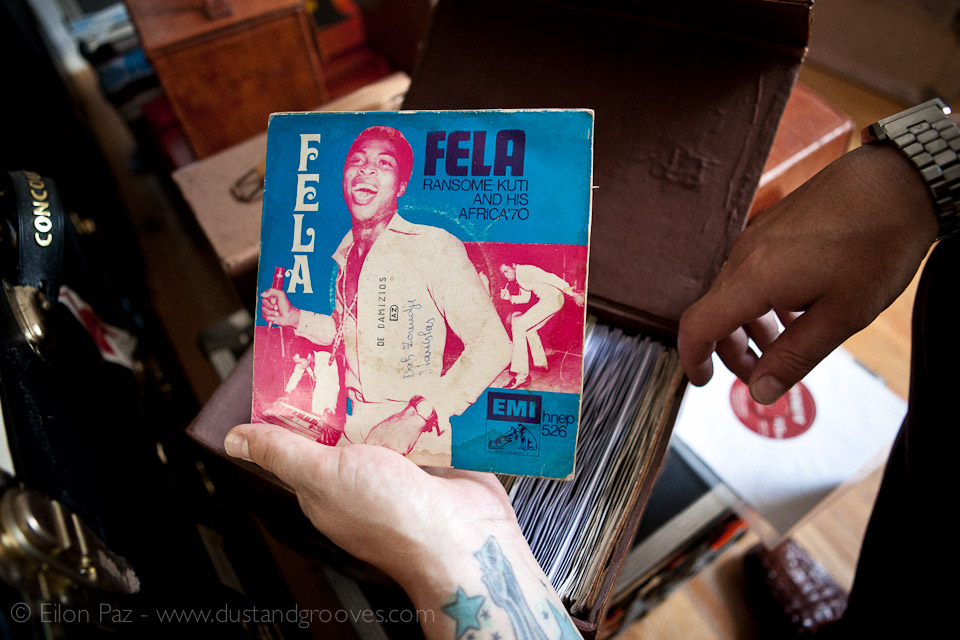
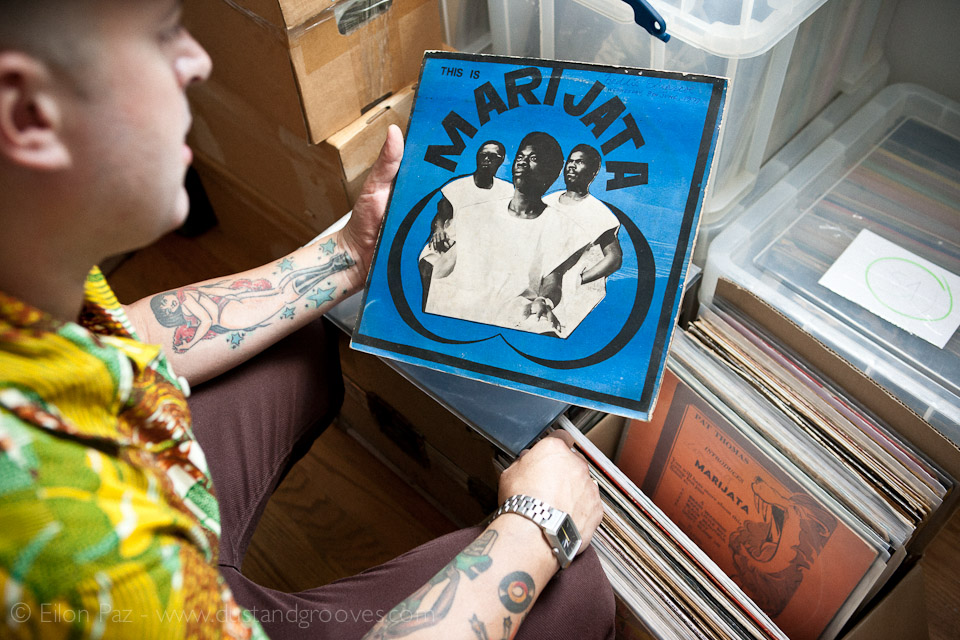
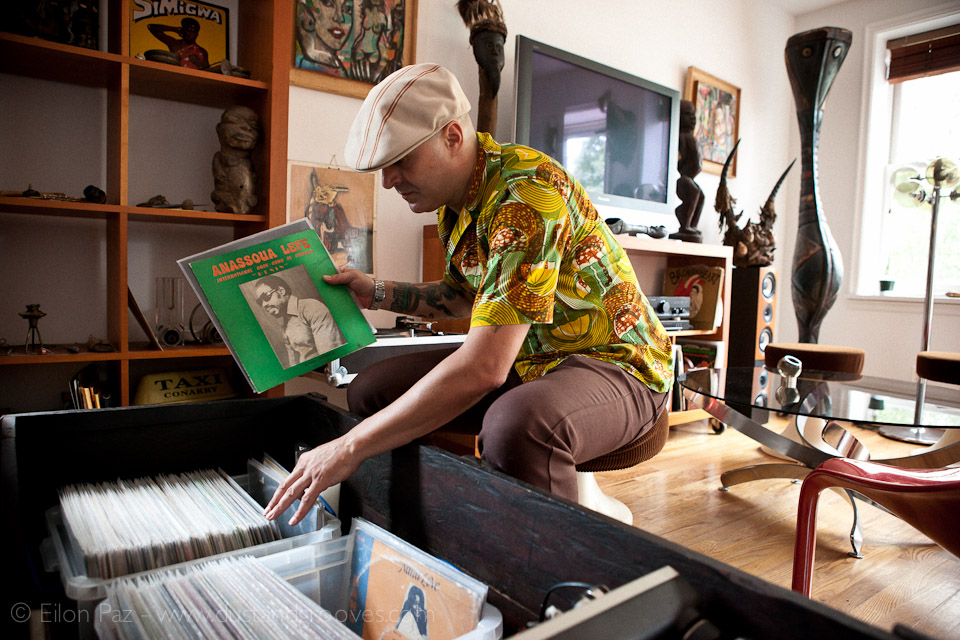



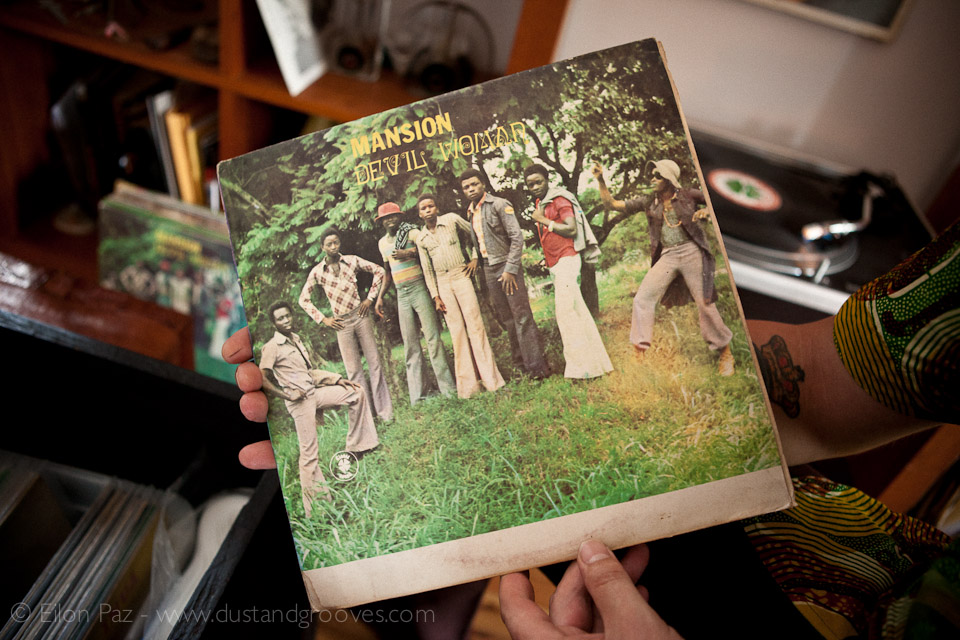
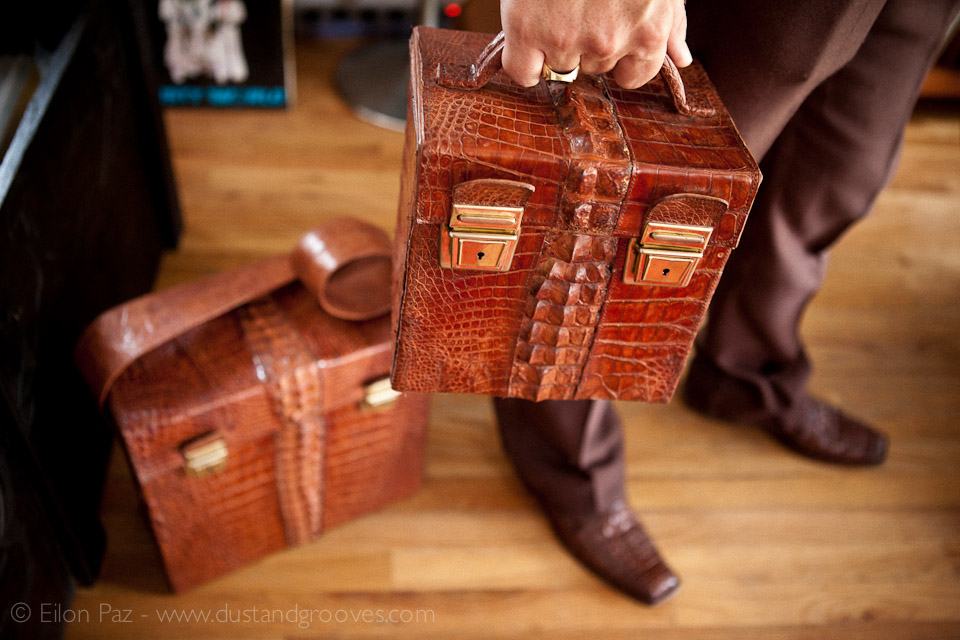
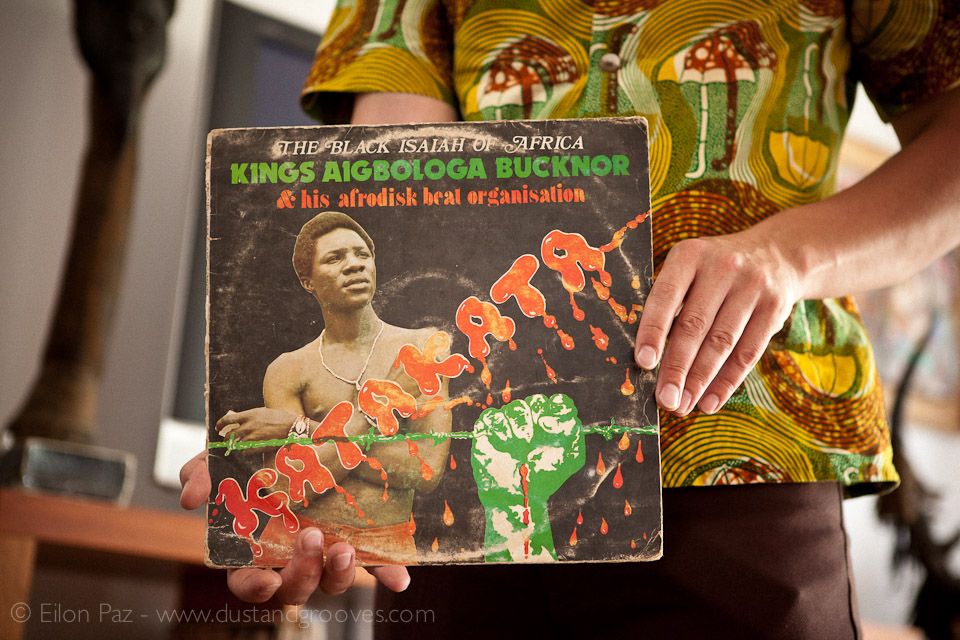
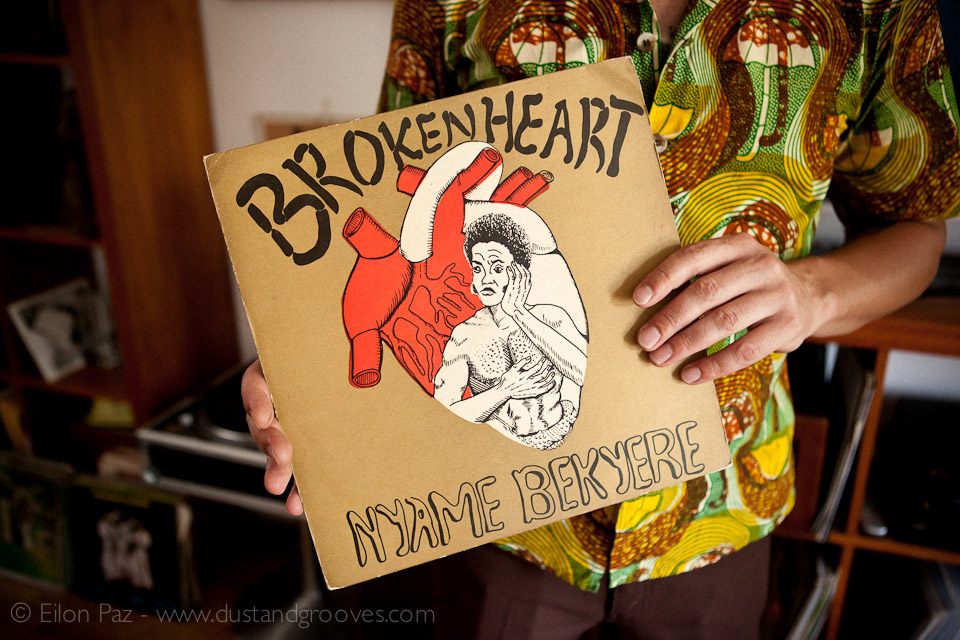
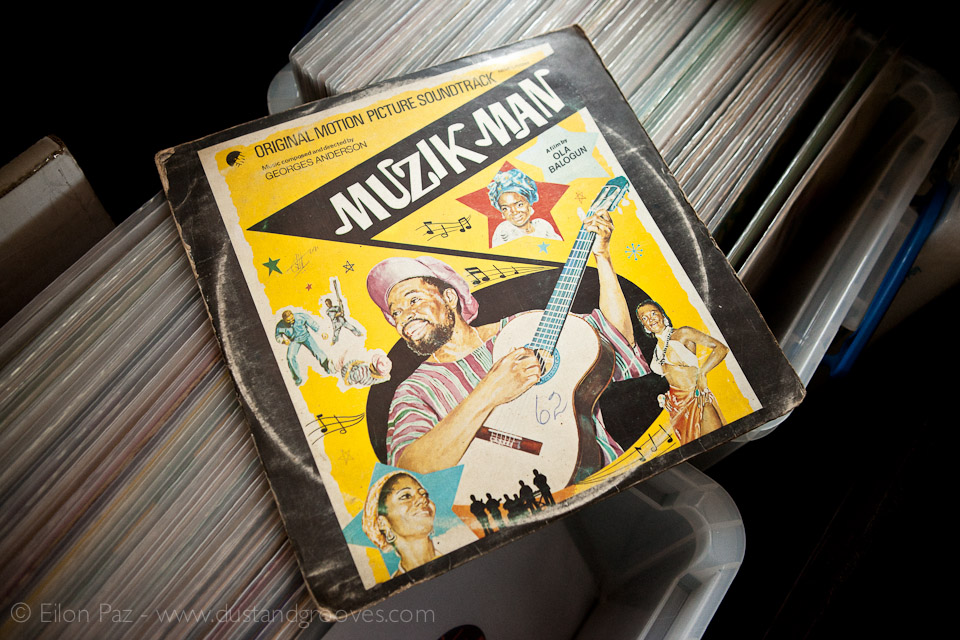
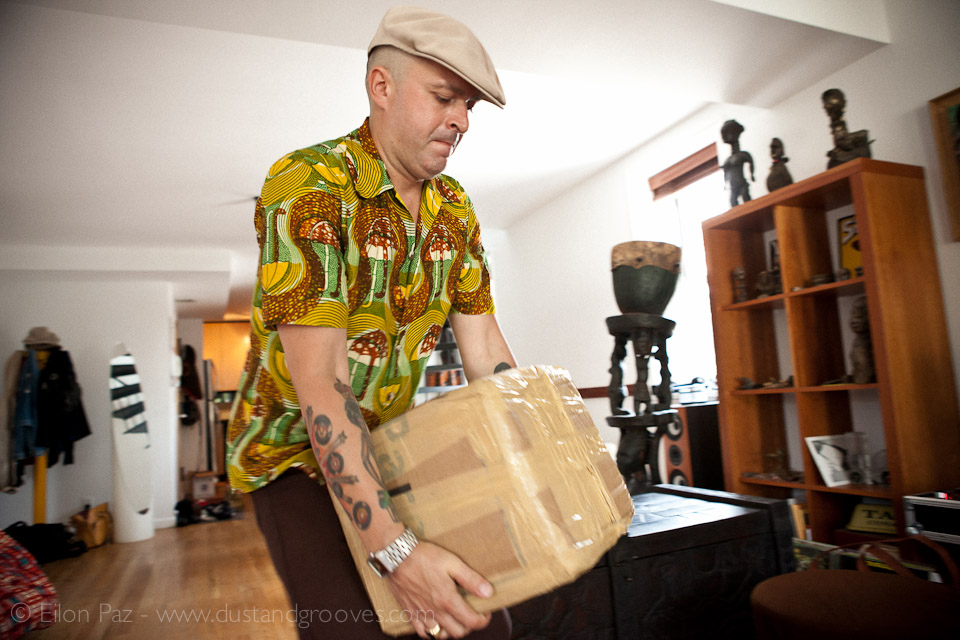
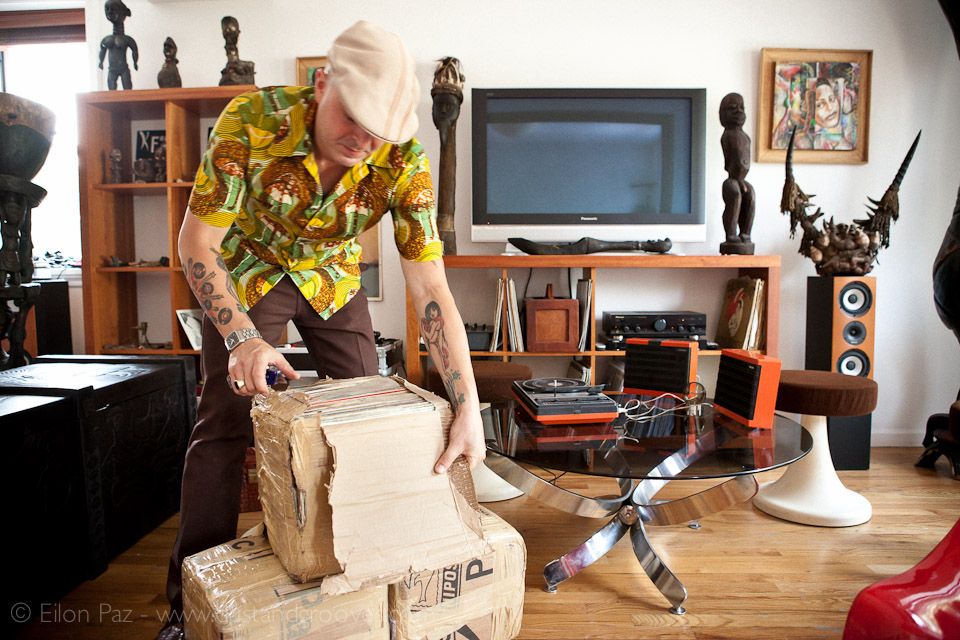
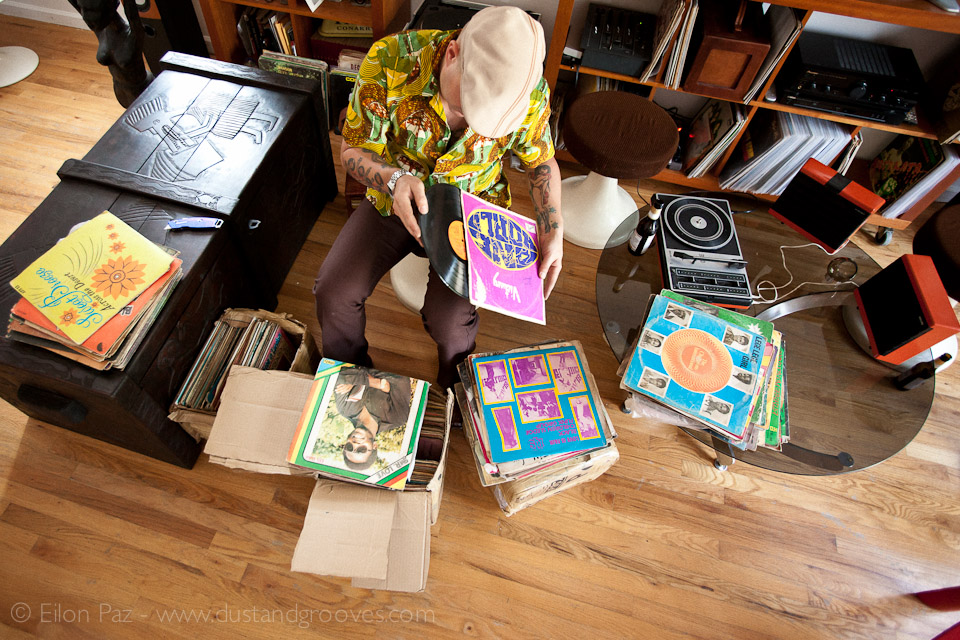

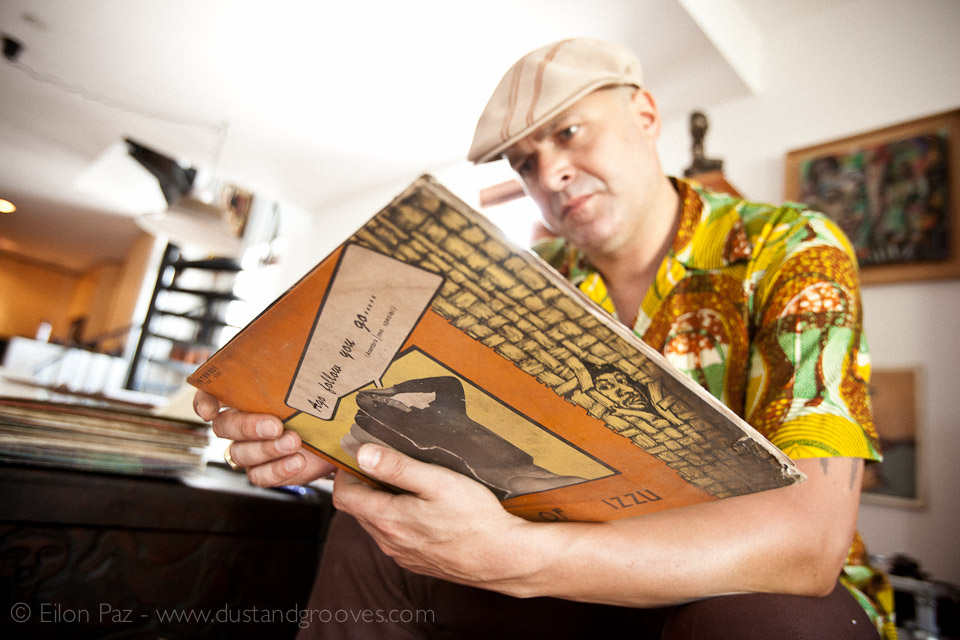
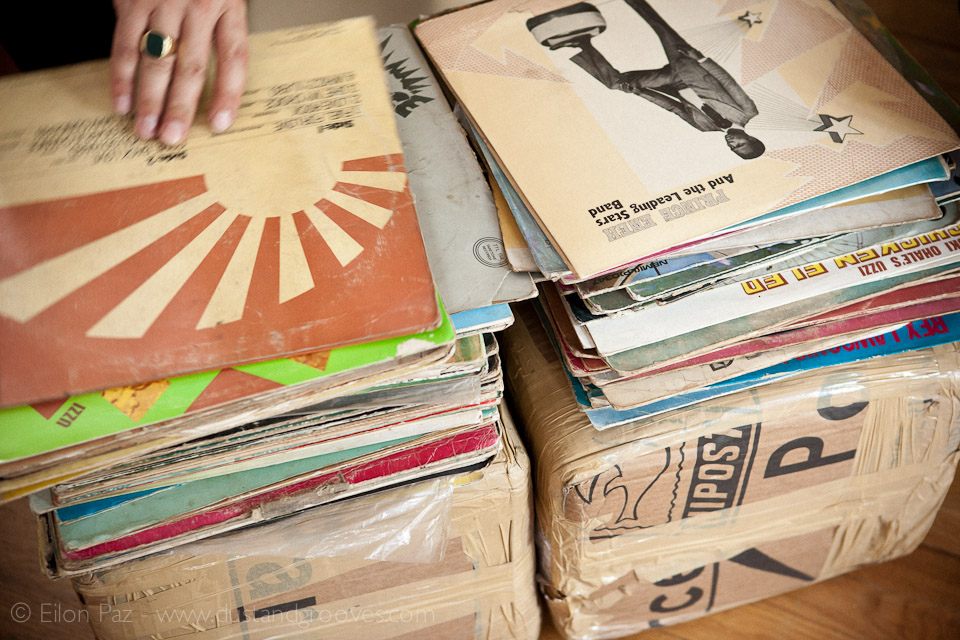
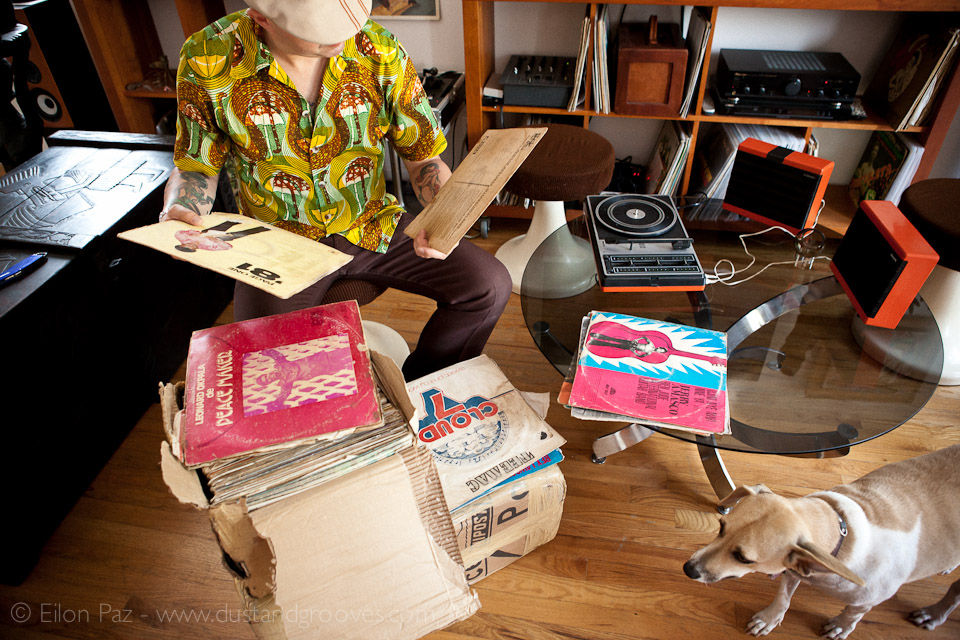

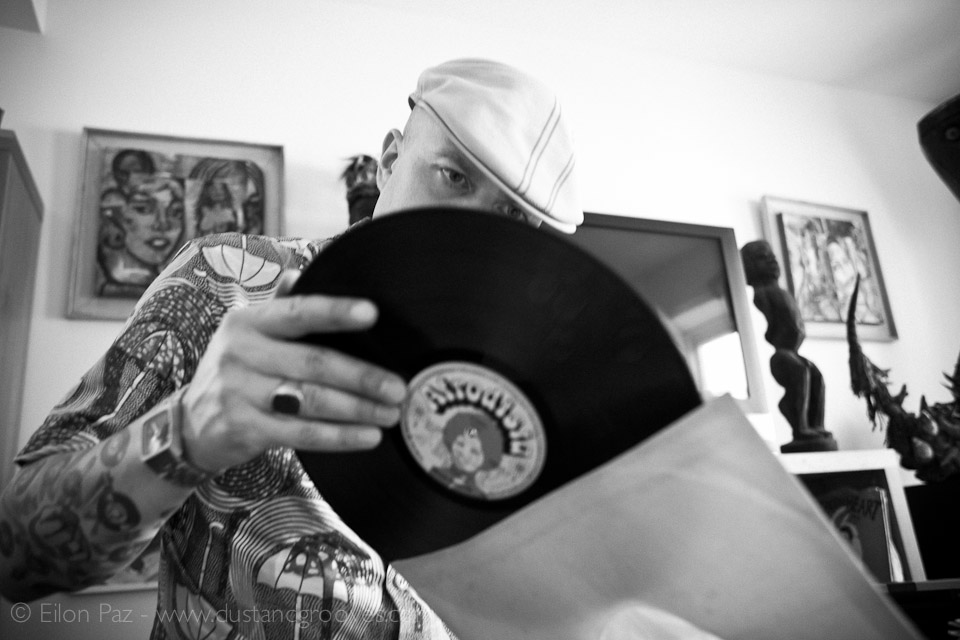
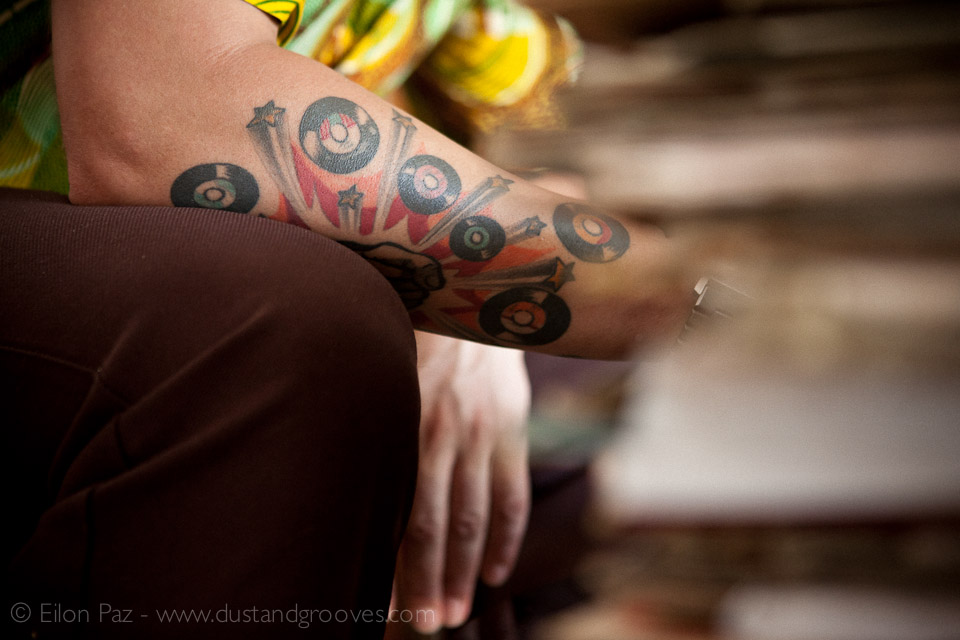
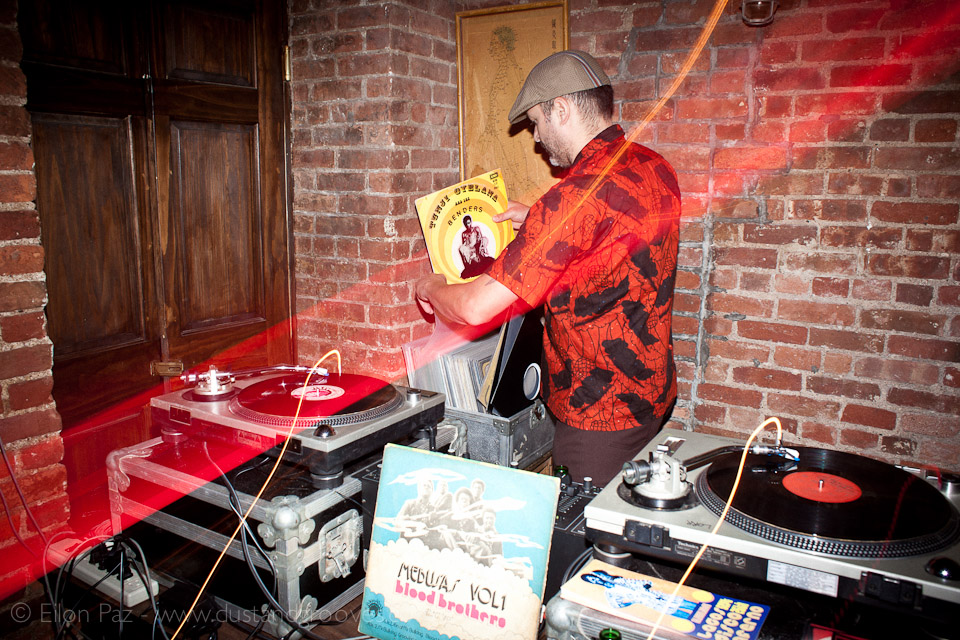
Thanks so much !! ;-))
Fantastic interview!
Keep it up
Steve
"Secret digging techniques"?? Frank, please come off that total BULLSHIT. You're a self righteous, arrogant fool. Grade A Clown.
Easy there sunshine, this was a joke. I would hardly invite photographer or documentary film crews to come along on my digging trips in Africa if I anything I do was „secret“…
https://www.youtube.com/watch?v=To1xL-k2SCk&feature=youtu.be&t=16m51s
Frank's the man. An inspiration.
Where did he get those plastic LP containers???
Dear anonymous!
I will keep your comment here because I think everyone should be able to speak out. But I do agree with Frank, you can't bash into people behind an anonymous mask. it's sheer cowardliness.
If you have unfinished personal business with Frank, or you are just jealous, try to find a different place to raise your voice.
I try to keep this place a positive one.
Thanks
Eilon
Hi Frank,
Good job and very nice interview! Can't wait to see you perform at Marula Barcelona. Is that the original copy of the Mebusas L on the last photo?
Best,
Pau
i like his comment about ipod culture.
those speakers are super nice. wonder what kind they are…
woo!
i'd love to listen to vinyl with ya
-velvette
Thanks you Franck for this wonderful itw !!
And thank you Eilon for your blog, I really really appreciate your work !!
Great post, great music!
I will link you both on
http://prettigeplaatjes.blogspot.com
Hi Frank,
thumbs up from the old homeland and thanks for the credits!
I would have never believed that, but I really dig that African stuff.
TC, W.
Thank you so much for this interview. The love of music that comes through is inspiring and I highly respect the preservation work and mission that Frank is on. Hope he'll be able to do it for many more years to come.
Hi Frank
This is a funny way to meet again after how many years since Burdon's is shut. Great interview, love it.
Keep up the good work. Funny enough I am heading for Ghana in three weeks time,it would be a pleasure to meet you down there.
Burdon
This was exhilarating and exhaustive. There are lots of blogs out there on vinyl colections but very few on the passion of being a collector out there, and yours is unique in the sense. Besides its of of the best blogs on any subject! And this one on Frank Gossner was your best!
Frank been diggin' your blog and vibe for a while now but man this interview was amazing i now feel so not worthy thank you for the good work your doing to elevate the music you love to all our ears and for the tasty mixes and samples provide here so much r-e-s-p-e-c-t
Vinyl Rules indeed thanks to you as well Ellion
Cheers
Record Brother
so great. thanks!
How thee man play records like that on such a fuck up piece of shit record player me never know… smh
No need for those kind of words, that’s a vintage, portable Philips and if you want to know why I’m using this and not my 1200 to go through hundreds of uncleaned Nigerian records you should rad the interview. It’s all explained in there.
Frank,
To say I am stoked about hearing you will reissue the Freedom Family record would be a gross understatement. That is a boss move, can't wait for it! kudos on all the killer reissuing work…also looking forward to the Marijata albums too.
Amazing piece. Great insights. As a long time vinyl lover, digger and DJ I've been so put off by "advancements" of the last few years, this is very refreshing.
Thanks for exposing me to so many different sounds! Love the blog.
And…
A fantastic organization is working to instill a love of music in children 9-14. The Roots of Music Program fills a void in music education programs in New Orleans educational institutions. Please support the cause by simply watching this short video below. For every view, $1 will be donated to the Roots of Music! Thanks so much!
http://www.spin.com/…adiq/index.html
Keep up the good work!
What a good post ! Amazing.
But not a single word about "Take Me Away Fast". Any news concerning this project ?
You can watch it here:
https://youtu.be/5_6J0LlsV6g
Sadly most of the footage including a live show by Gilles Gonnas turned out to be unusable due to unsteady camera work but it is what it is… better than nothing, I guess.
Wow! This simply has to be one of the most interesting interviews I've read in quite a while. Thanks so much!
This dude is the man. He knows what he's talking about and Im glad to read that Frank pointed out the corruption that comes from western comapnies..I really can identify with the the way he speaks his mind. there are many idiots..like the one here getting mad beacuse Frank said something about secret digging shit..even if it is so..well he has to right to say or not say..thats the game of digging..Dj's back in the day used to even cover the titles of their covers and records.
But anyway, i can dig ti.
What im curious about though is how do you make a living for yourself Mr Frank, if you dont make a profit forwarding thse african records?
or maybe its in the interview, cause for today I only read till the "corruption" part. (Screen hurtin my eyes).
One Love!
Absolutely great stuff. I read this a couple of months back and had to come back to skim it again. Love the comments too, especially the negative ones.
It's nice that someone is worried about Frank's choice of record players. I can only hope that, as a record collector, I never get so anal about it that I'm afraid to play records on my own crappy portable, let alone worried about what other guys are doing.
Keep digging Frank and keep letting us know what you've turned up. Fascinating stuff.
What a great blog! Check out this on Russell Solomon who was instrumental in the "record era"!
http://encyclopedia.jrank.org/articles/pages/6363/Solomon-Russell-M.html
I liked this guy until I read about the alligator skin stuff.
The coast of Guinea has vast mangrove systems which are littered with these animals. Local fishing communities traditionally hunt these animals for their meat which is a common and important source of protein. The hide is a side product and in most cases doesn’t even get used. The Nile Crocodile is an invasive species down there and larger specimen often move into settlements and kill lifestock like goats or chicken and not too rarely attack humans.
from Wiki: “The Nile crocodile is one of the most dangerous species of crocodile and is responsible for hundreds of human deaths every year. It is a rather common species of crocodile and is not endangered despite some regional declines or extinctions.”
I randomly bought an Afro beat compilation from Analog Africa a few months ago because I kept hearing about Afro Beat but had not got around to checking it out, after a few seconds my mind was completly and utterly blown, such amazing music that hardly anyone knows, good to see Frank keeping it alive.
Hey, do you buy or sell some of these records. i have a couple and I am really intrested all the nigerian music you've got. Feel free to reach me on 100percentnaija@gmail.com and also check my blog out :
http://9ijamusic.blogspot.com/
Pingback : Digging in Ghana with Frank Gossner : Dust & Grooves ~ Vinyl. Music. Culture
Pingback : Read A Book: ‘Dust & Grooves’ Digs Into The World’s Greatest Vinyl Collections | I Am Mo Better
Fantastic interview! I still listen to his “Syliphone Mix” from the defunct voodoofunk blog on a weekly basis. Hypnotic and beautiful music that everyone should hear…Thanks Frank for all you do!
Pingback : Pay me what you owe me – Black Info Now